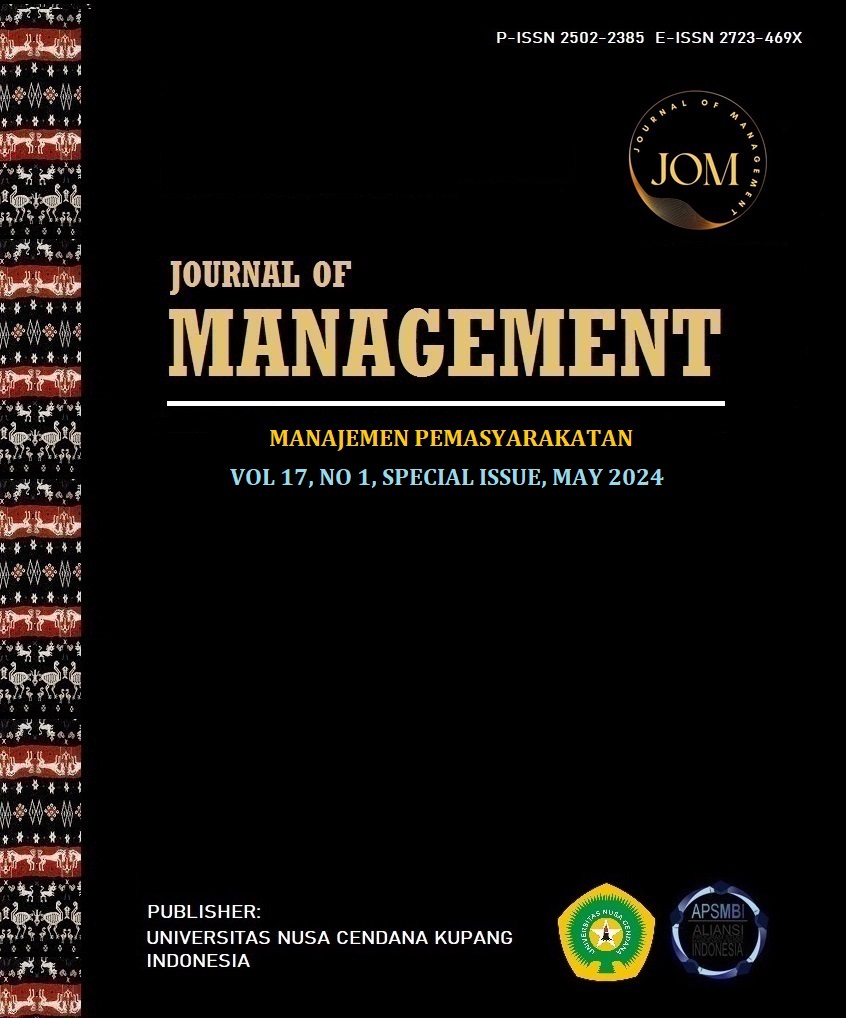PENGARUH SOCIAL SUPPORT TERHADAP SELF-EFFICACY NARAPIDANA THERAPEUTIC COMMUNITY LEMBAGA PEMASYARAKATAN NARKOTIKA KELAS IIA JAKARTA
Abstract
During the Therapeutic Community, prisoners need social support to be able to increase the level of self-efficacy during the Therapeutic Community program. The purpose of this study is to determine and examine the effect of social support on the self-efficacy of Therapeutic Community prisoners in Class IIA Jakarta Correctional Institution. The number of samples studied was 132 responses. The method used in this study is to use quantitative sampling techniques with Probability Sampling with the type of Cluster Random Sampling. The results obtained a coefficient of determination (R-Square) of 0.526 which contains the understanding that the influence of the independent variable (social support) on (self-efficacy) is 52.6%. The significance test showed the effect of social support on the self-efficacy of Therapeutic Community prisoners in Class IIA Jakarta Narcotics Correctional Institution
Keywords: Social Support; Self-Efficacy; Therapeutic Community
Downloads
References
Bandura, A., & Wessels, S. (1994). Self-efficacy (Vol. 4, pp. 71-81).
Cendy & Prayitno, S. W. A. (2020). Efektivitas Program Aksi Penanggulangan Dan Pemberantasan Narkoba Di Lembaga Permasyarakatan Klas Ii A Narkotika Nusakambangan. 6(1), 1–9.
http://journal.um-surabaya.ac.id/index.php/JKM/article/view/2203
Creswell. (2018). Research Design Qualitative, Quantitative, and Mixed Methods Approaches (Fifth Edition).
Fattah, J. K. S. (2022). Efektivitas Pelaksanaan Program Rehabilitasi Sosial Dalam Menekan Angka Residivis Pelaku Tindak Pidana Narkotika Di Lembaga Pemasyarakatan Narkotika Kelas IIB Muara Sabak. Universitas Batanghari.
Gottlieb, B. H., & Bergen, A. E. (2010). Social support concepts and measures. Journal of psychosomatic research, 69(5), 511-520.
Nazir, M. (2013). Metode Penelitian. Bogor: Ghalia Indonesia
Prasetyo, T. (2011). Hukum Pidana. Jakarta: Raja Grafindo Persada.
Rustika, I. M. (2012). Efikasi diri: tinjauan teori Albert Bandura. Buletin psikologi, 20(1-2), 18-25.
Schunk, D. H. (1995). Self-efficacy, motivation, and performance. Journal of Applied Sport Psychology, 7(2), 112-137.
Schwarzer, R., & Jerusalem, M. (1995). Generalized self-efficacy scale.
Sugiyono. (2013). Metode Penelitian Kuantitatif, Kualitatif, Dan R&D. Bandung: Alfabeta.
Taylor, S. E. (2011). Social Support: A Review. The Oxford Handbook Of Health Psychology, 1, 189-214.
Winanti, P. (2008). Therapeutic Community Lapas Kelas IIA Narkotika Jakarta. Wordpress, 12(1), 1–15. Https://Doi.Org/10.1177/053331647901200104
Wijaya, I. P. (2012). Efikasi Diri Akademik, Dukungan Sosial Orangtua Dan Penyesuaian Diri Mahasiswa Dalam Perkuliahan. Persona: Jurnal Psikologi Indonesia, 1(1).
Weinman, S. Wright, & M. Johnston, (2003). Measures In Health Psychology: A User’s Portfolio. Causal And Control Beliefs, 35, 37.
Zimmerman, B. J. (1995). Self-Efficacy And Educational Development. Self-Efficacy In Changing Societies, 1(1), 202-231.

 Elsywenda Gloria Chintiani Bokko(1*)
Elsywenda Gloria Chintiani Bokko(1*)



